4,044 words
Since the Glorious Revolution of 1688 that established parliamentary and Protestant rule in Britain, the Anglo-Americans have been on the winning side in every major international conflict.
— Walter Russell Mead
There is a justifiable critique of globalism and modernity that we participate in at Counter-Currents. However, there is a modernity that we should learn to live with. In fact, not only are we participating in this modernity, we are agents of it. Such a modernity is the way of the Anglo.
Yes, the Anglo-Saxon. What in Australia they call Anglo-Celts and in old Rhodesia the Britishers. There are a number of ways to look at this group. One can look at the people of the English shires, the glory of the British Empire, the whites of the US South, the Anglophones of Canada, or the WASPs of the Northeastern US. The best way to look at Anglos is through the world that they created: the British Isles, the United States, and what were called the White Dominions of the British Empire.
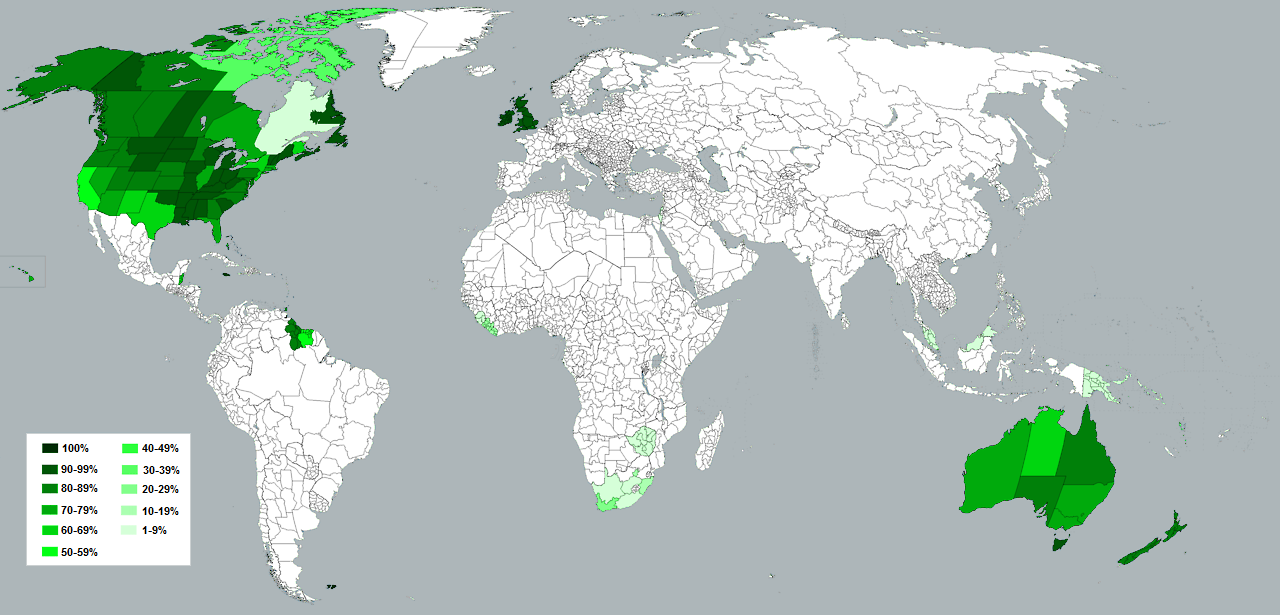
Percentage of native English speakers by territory; the Anglo world. The Anglos have managed to colonize two continents. [1]
Who Are the Anglo Settlers?
Both books specifically reject a racial definition of the Anglos. In this day and age, it is hardly likely that any mainstream professor or intellectual would get published otherwise. However, after the protests against a racial definition, it is clear that both authors accept that there is a racial and ethnic basis to all of this. Mead writes about “the primitive folk laws of the wandering Germanic tribes who founded Anglo-Saxon England.” [2]
Of the Americans in the 13 original colonies, Belich writes that “only 6,000 Dutch, 5,000 Irish, and 2,000 Scots joined 148,000 English before 1700. Irish, Scots, and Germans streamed in thereafter, but in 1790, Europeans in the infant United States were still 80% British, 9% German, 6% Catholic Irish, and 3% Dutch — less a melting pot than a British stew with a dash of neighbors.” [3]
Critical to this population was the fact that the Anglos brought their women and children from the get-go. In 1780, New England’s population of Yankees was seven times the amount of Quebec’s Francophone population. What made the imbalance was the difference between the numbers of, “founding mothers — perhaps 8,000 [English] as against 1,100 French.” [4]
It is clear from later settler flows described by Belich that those of the Anglo type are made up of more than just the English, although the English are the central pillar of the structure. The groups that populated the wider Anglo world are the following:
The British: The English are the sine qua non group and remain the backbone in terms of population and investment capital. Due to their thrift, work ethic, and high literacy, Scots became critical “junior partners” who tended to head firms and provide on-the-spot leadership.
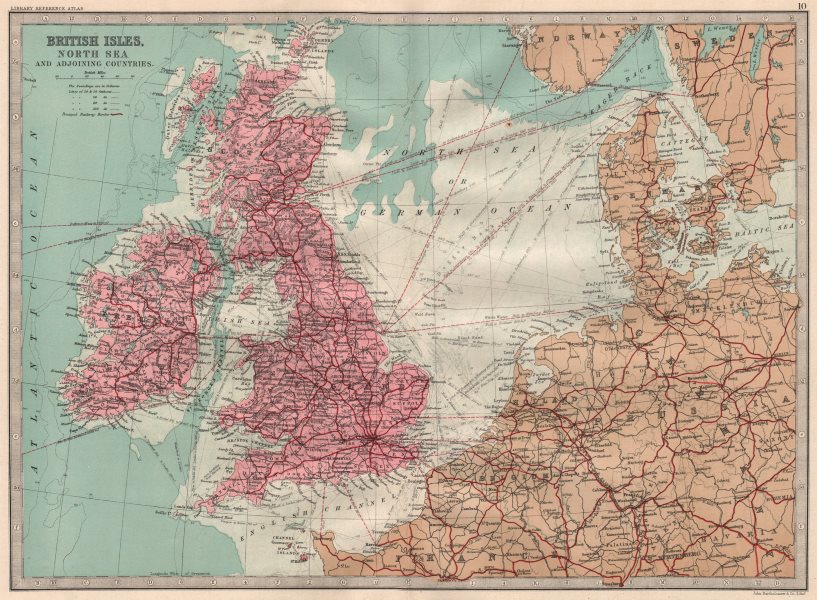
The Old Americans: This group is of mostly British origins, though the Dutch and Huguenots played a critical role. According to Belich, the key drivers of American expansion in terms of both people and capital originated in the Mid-Atlantic States. However, New Englanders were the critical “junior partner” much like the Scots were in the British group.
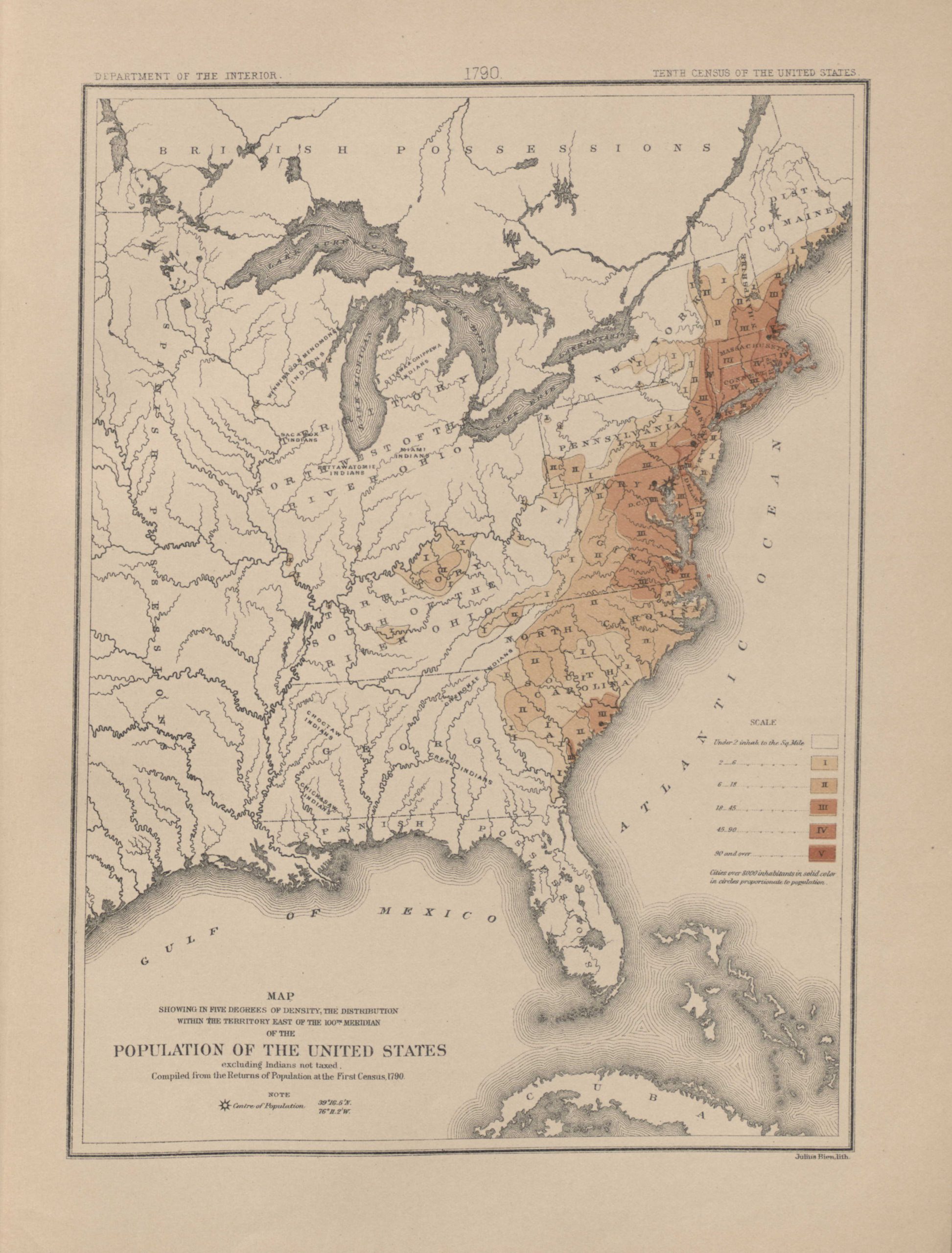
The Irish: The Irish were the “chief lieutenants of Anglo settlement.” Much of the Irish outmigration consisted of the British Protestant settlers who were either Irish Celtic converts or British colonists to Ireland following the Tutor Conquest. The Catholic migration to the Anglo world came later, but still started before the Potato Famine. The Irish diaspora in America is approximately a 50-50 split between the two groups. The Catholic Irish had the hardest time joining in with the others; their political activism in the 1800s serves as a model for non-white groups today.

The Germans: The connection between the British and Germans is through Hanover and its Royal Family. The first Germans to settle in America came from the Rhineland Palatinate. Eventually, Germans of all kinds, especially the northern Protestants, became part of the Anglo Settler group. The German group should also include Danes, “Transylvanian Saxons,” and the stalwart and steady “Russian-Germans.” I’ll also add that Germanophile Slavs such as the Slovenes and Croatians fit into this category. Germans migrated to America and New Zealand in staggering numbers. Until the World Wars, the Anglo world was very proud of its German blood.
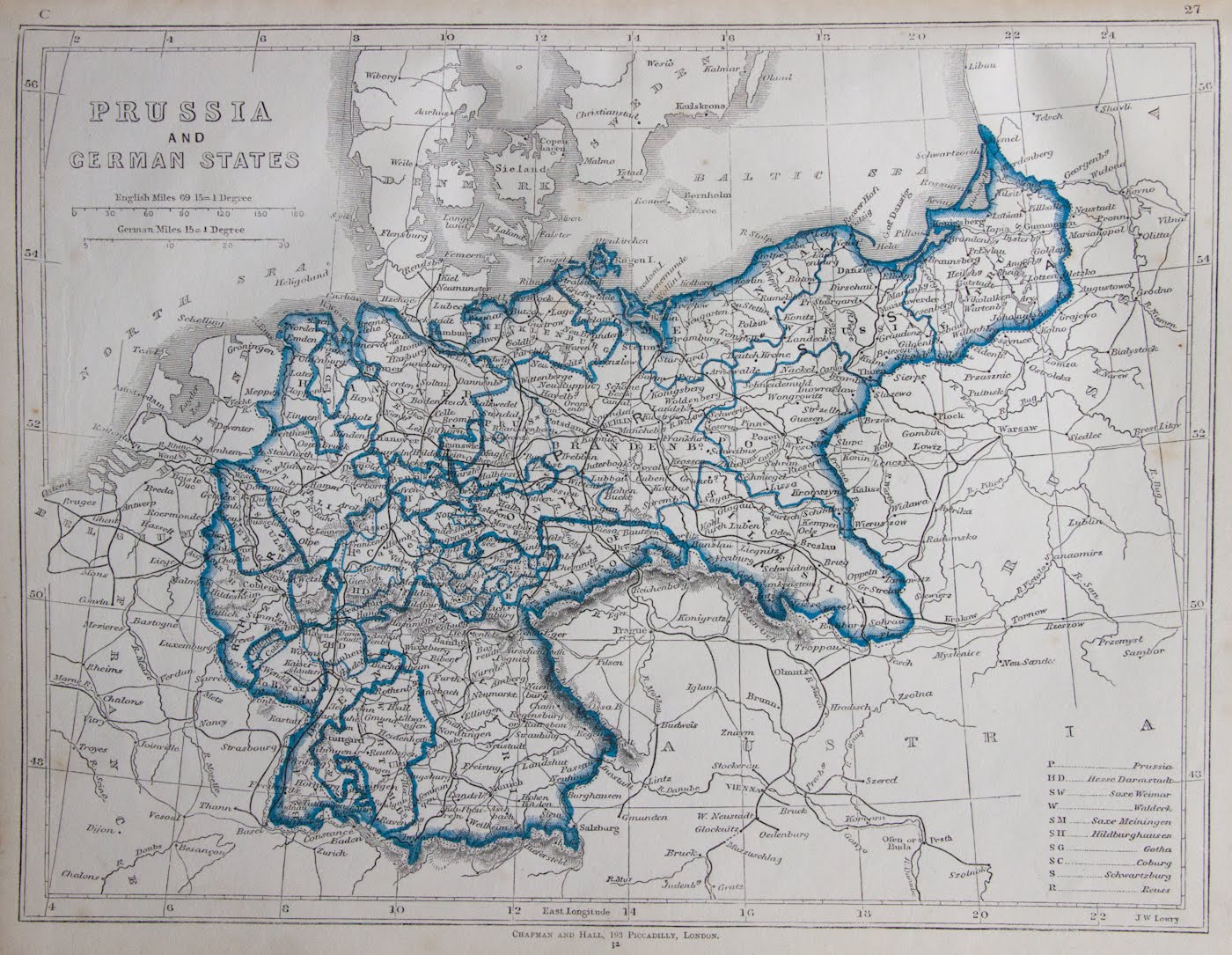
Obviously, the Germans and Catholic Irish that stayed behind never joined the Anglo world, but there is a commonality in those societies with the Anglo world — especially in Germany. Later immigrant groups like the Swedes, Italians, Greeks, and Poles migrated into the Anglo world, but a large amount of these later arrivals never settled permanently. It is likely that none of these groups felt as at home in the Anglo world as the others, and their migrations occurred after transportation and communication became cheap and easy. Today, there are many Greeks, Poles, and Italians living on an American retirement plan in their respective homelands. It is clear that non-whites have never fit into the Anglo world except in the lowest part of the labor market. On a final note, the continuing troubles in Ireland and the First and Second World Wars should be seen as an appalling disaster to the people of the Anglo world — truly ugly civil wars.
Settler Ideology and the Boom-and-Bust Cycle
Belich starts his narrative with the events of the American War of Independence. It is the only major war that the British lost between 1688 and the end of the Cold War in 1991. Both parties saw the conflict as a civil war. The number of participants was also large; the Americans eventually fielded 200,000 men, and the British sent out 500,000 (although the British carried out other operations at the time as far away as Asia). Both parties brought in foreign forces; the British hired Hessians and stirred up the Indians, while the Americans successfully reached out to the French and Spanish.
At the conclusion of hostilities there were still plenty of bad feelings between the British and Americans going around, enough for a second, half-hearted war from 1812 to 1814 with occasional war scares that lasted until 1890. However, the overall trend of the bad feelings throughout was ever downward, and good feelings were ever upwards. Additionally, commerce between the British and Americans never let up. There was a cynical mercantilism to this; factories in Birmingham, England manufactured “War of 1812 Victory Furniture” for Americans. Vermont was the scene of illicit trade between the British and Americans even as the young men from Vermont and Canada battled it out at Chippewa. Although independent, the United States was a pillar of support to the British Empire.
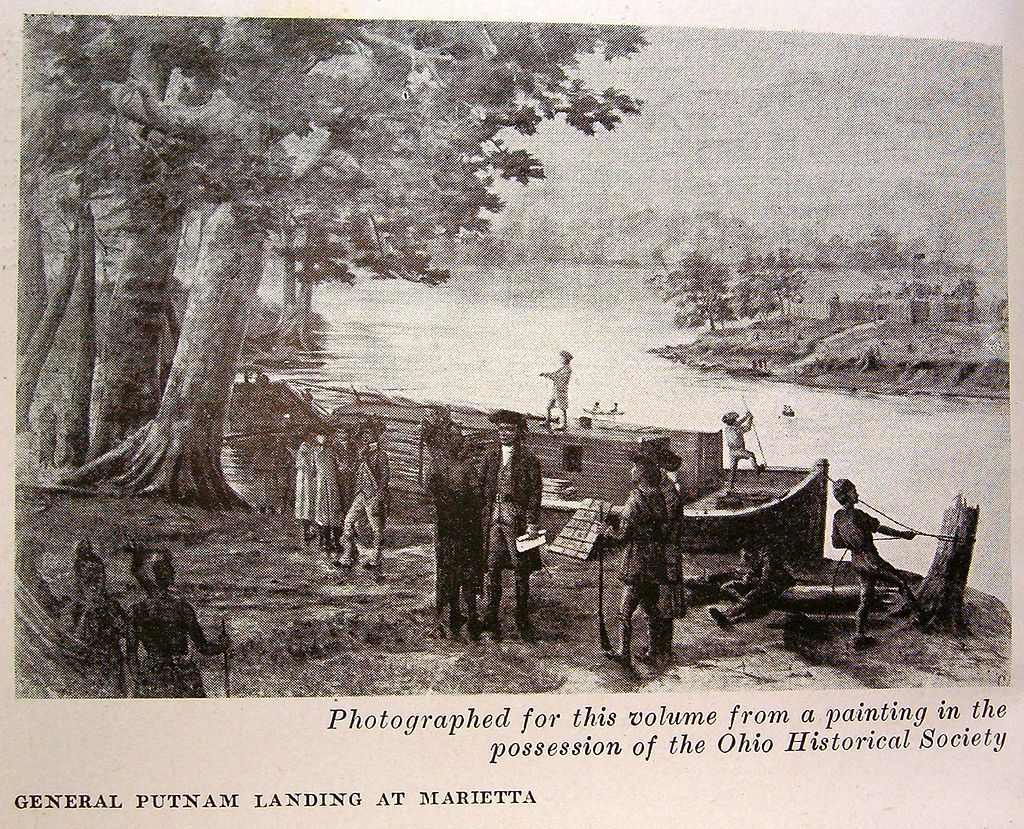
“Look, ye sons and daughters of New England, look what a farm can be in Eden. Come down from your granite hills, which you foolishly call farms. Here in Illinois the life of a husbandman is fed by the bounty of the earth and sweetened by the air of heaven.” [5]
Mead goes further. He argues that the Anglos identified with the story of Abraham in the Bible. Abraham has a conversion experience, leaves his homeland and old ways, and heads out to a new land. According to Mead:
. . .the follower of Abraham is reaching out toward something positive — a haunting, transcendent call that bespeaks a reality richer and more rewarding. Embracing change becomes a kind of sacrament; moving from the known to the unknown brings one closer to God. Change has a religious sanction and a positive value; excelsior is the direction toward God. Change is no longer a necessary evil that must sometimes be endured; to embrace and even seek change is to encounter the meaning of life. . . As American religion, in particular, became more personalized and emotional, its identification with Abraham’s faithful response to change only deepened. The distinctive American religious evolution may help explain why the United States has gone west further and faster than the other English-speaking countries. [6]
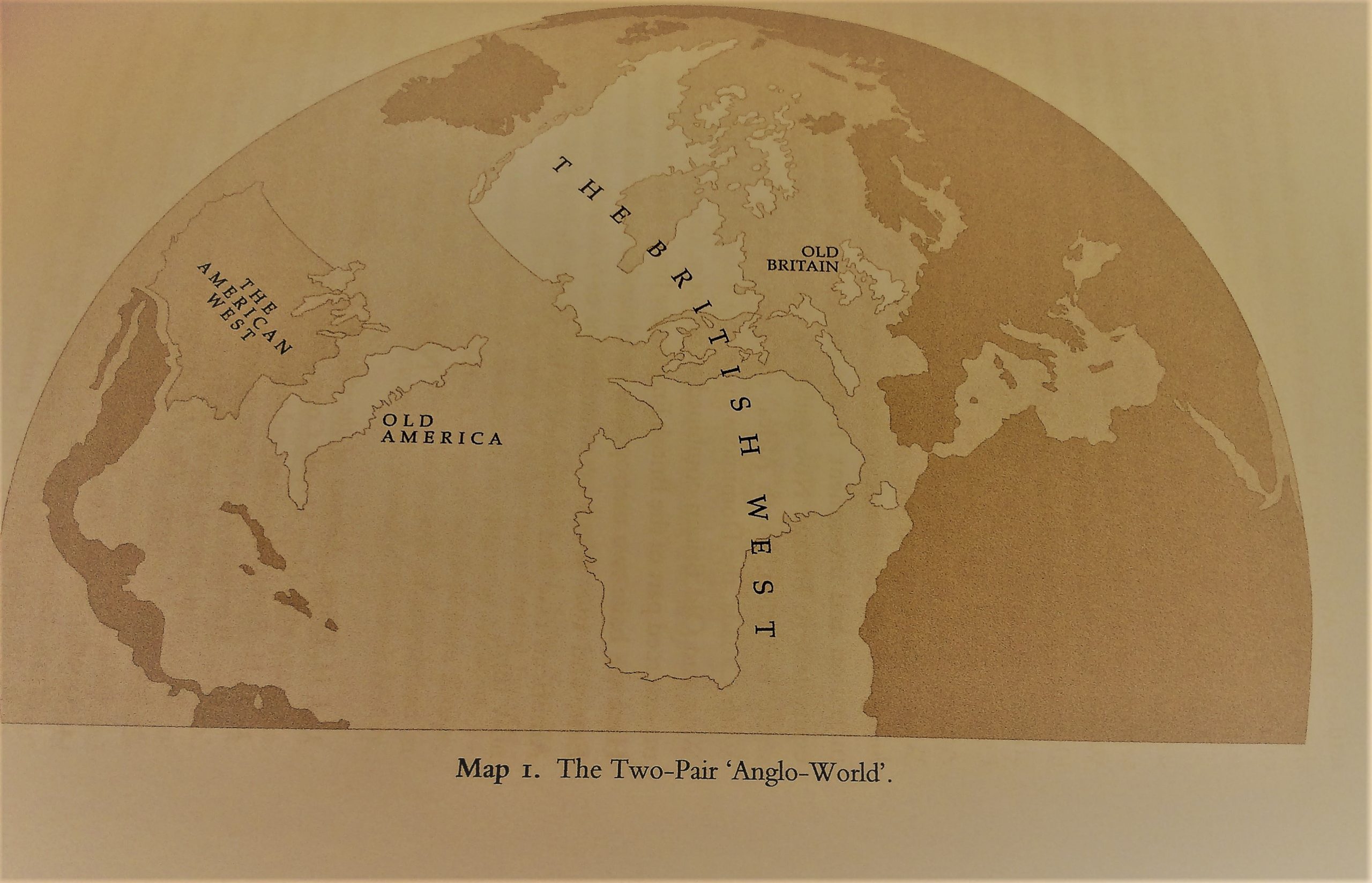
The Anglo Wests. Old America had North America west of the Appalachians. Britain had Canada, Australia, and New Zealand. Not to mention smaller colonies like the Falklands, Rhodesia, Natal, etc. [7]
All of the clones experienced initial booms followed by a bust and then the local economy would stabilize. Belich describes the booms in each place as well as how the basics of each economy ended up working. Early Cincinnati is interesting for several reasons. First, it is much like developments elsewhere. Additionally, Cincinnati’s settlers transported their goods back to Old America to sell by sending them downstream to New Orleans and then by ship to the East Coast. It was not until steam engines and canal and rail systems improved that shorter routes over the Appalachians were used. In other words, the Anglo settlements practiced practical commerce aligned with natural forces.
All of the new settlements used local resources — especially the forests. Wisconsin’s trees, for example, were felled to make Chicago. The primary fruit of the axe was firewood to run the steamboats and heat the homes. Belich also argues that the cities were the spearheads for the development of the farms — it was not the other way around. Melbourne, Victoria experienced a massive boom and a deep bust in the late nineteenth century.
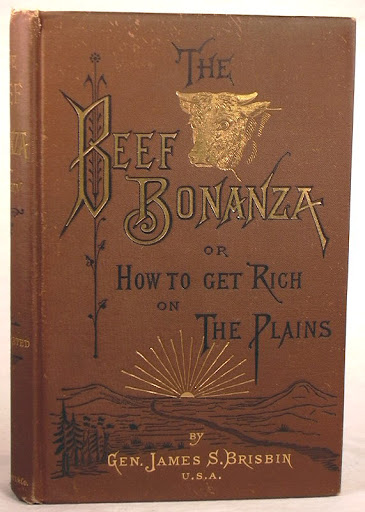
Booms followed by a crash were a big part of the Settlerist expansion of the Anglo Word.
Comparing Lightning to Lightning Bugs: Anglo Colonies vs. European Colonies
The colonial enterprises of the Anglo world are different from the colonies of other powers in that their existence was never strategically independent of the Anglos. As Anglo-American power increased, it became a solid fact that Anglos could capture the colonies of their European rivals whenever they chose to do so. The Americans and British conquered Quebec in 1760, and the British captured Cuba in 1762, but returned it to Spain as part of a peace deal. It was the Royal Navy’s blockade that made the Haitian slave revolt successful. During the Napoleonic Wars, George Canning, (1770 -1827) was not idly boasting when he said that he “called the New World into existence to redress the balance of the Old.” British policy made Latin America independent from Spain. The British easily captured the Dutch Cape Colony in 1795.

1914: The New Zealand Expeditionary Force captures German Samoa. British colonies built Empires of their own.
After 1815, writes Mead, “the Germans, Belgians, and Italians made colonies [from 1815 to 1914]; the French did a little more, but not much. The British made a new kind of world.” [8]
The Anglo world clones became powerful empires in their own right. In 1898, the American conquest of the remains of Spain’s empire turned out to be a matter of marching. During World War I, the British colonists in South Africa captured German South West Africa, New Zealanders captured German Samoa, and the Australians captured German New Guinea.
The other European Empires did do amazing things, but none cloned themselves quite like the Anglos, or matched Anglo economic, military, and cultural dynamism. Spain captured and intermixed with the Indian Empires of the Aztec and Inca, but only in the southern cone of South America did Spain come close to cloning itself as the British did elsewhere. Portugal created a clone of itself in Southern Brazil, but the rest of the Lusophone world is a thin Portuguese veneer over a large non-white or mixed-race population. Russia’s experience in Siberia is close to that of the Anglo world, but Siberia is a cultural backwater in a way that Perth is not.

Although Algeria was something of a French version of the American Wild West, the French didn’t make their North African possessions a New France in North Africa.
The non-British/Anglo European colonies were more like that of the French experience in Algeria than the Anglo development of Chicago, Cincinnati, or San Francisco:
Between 1842 and 1846, 198,000 Europeans arrived in Algeria, but 118,000 left, many died, and few were women. The settler population fell in some years and stood at 62,000 in 1847. . . By 1886, the settler population of Algeria had reached 430,000, only half of them French. [9]
In the Anglo world, the population in Chicago was 503,185 in 1880 and 445,000 in Melbourne in 1889.
The French never invested in Algeria like the Anglos invested in Melbourne or any other boomtown. The Algerian project was government-inspired and never captured investment capital or individual investors on a large scale. The settlers of Melbourne drew large investments from capitalist firms, and as individuals, they purchased plots of land and invested in municipal bonds or other items. Melbourne did have a bust, but the foundations for a permanently wealthy city were laid.
Anglo Culture: The Protocols of the Elders of Greenwich
The key thing about the expansion of the Anglo world is the demographic expansion of the English. In 1480, the population of England was around 2,000,000. By the dawn of the twentieth century, the English population in England, America, and the Colonies had expanded nearly 50 times over. Only 49 of the Mayflower passengers had children, but their number of descendants today is estimated at above 30,000,000.
However, the Anglos have something more than just numbers. After all, China has a big population that is said to be “high IQ,” but China doesn’t have what the Anglos have. There is a cultural dynamism that brings wealth and military dominance. This dynamism is present in the rest of Europe — Spain, for example, is richer than the whole of the Islamic world if one takes out Mohammedan oil revenues, but Anglos vastly outstrip the Spanish. Mead argues that there are specific cultural traits that give the Anglos a dynamism that their neighbors do not have. He semi-jokingly calls these ideas the Protocols of the Elders of Greenwich. I’ve packaged Mead’s ideas into the bullets below, but added my own, more frank ideas in several places:
The Anglos Created an Open Society

You can buy Greg Johnson’s The White Nationalist Manifesto here
- The Anglo heartland of England is in a geopolitical goldilocks zone. England isn’t too small like Holland or too large like Russia. It is close to Europe to keep abreast of its cutting-edge developments, but far enough away to be safe from attack. Italy, France, and Germany carry out developments, but require big armies, authorities, and bureaucracies to keep free of enemies. Meanwhile, England’s open society is a natural pressure valve on social problems so disorder never gets too far out of hand such as with France. Big social disorders, such as the Battle of Culloden, do take place, but in the Celtic fringe rather than the central territory.
- The Reformation and Counter-Reformation was not a bloodbath such as in Germany or overwhelmingly to one side or the other like that in Spain or Scandinavia. The English Reformation and Counter-Reformation didn’t end with one side or the other really winning. As far as the state religion, most Englishmen took the attitude of the proverbial Bishop of Bray — they simply adjusted to the ever-shifting winds and settled upon a pluralistic, mostly Protestant society.
- Although they were pluralistic and officially Anglican, the ideas of Calvinism were powerful. Anglos work hard for the greater glory of God. Capitalism was not to be shunned, but embraced. Andrew Carnegie and Henry Ford were capitalists seeking to make a big profit, but much of what motivated them was a Faustian, post-Calvinist drive to change the world for the better.
The Anglos Can See the Invisible Hand
- In addition to their Faustian, post-Calvinist drive, Anglos “see the invisible hand.” That is to say, Anglos take different bits of data and from that come up with an overarching theory as to why thing work the way they do. Newton discovered the “invisible hand” of the Laws of Motion. Darwin studied South American animals and discovered the “invisible hand” of natural selection. Adam Smith discovered the “invisible hand” of the Law of Supply and Demand.
Anglos Are Comfortable With Capitalism & Use the Maritime System
- Anglos were very comfortable with complex financial and commercial activities. Mead does not mention this, but I suspect that part of the reason for this situation is that England probably had no Jews until after the arrival of William the Conqueror, and Jews were removed by King Edward I in 1290. The English thus came to control their own financial system, and banks became vehicles to safely transport and store money instead of loan-sharking institutions.
- The English copied the Dutch model that combined trade with maritime activities. English merchants could borrow money to conduct trade over the seas and everyone got wealthy.
The Anglo Way of War
- Anglos wage war not through “dominance in a particular theater; [instead] it is to dominate the structure that shapes the conditions within which the actors in each of the world’s theaters live.” [10] Anglos contain and bankrupt their enemies. George Kennan during the Cold War and the Duke of Marlborough during Queen Anne’s War used the same strategies.
- Anglo geopolitical and military strategy matches commercial engagements. In other words, the merchant traders are supported by the soldiers. Military efforts are profitable.
- Anglos allow rivals to enter their maritime system (although on Anglo terms). It helps generate wealth and clip potential enemies. Anglos also promote institutions in foreign countries that align with their interests. The Japanese Constitution was written by Anglo conqueror Douglass MacArthur. The Anglos helped replace Allende with Pinochet in Chile, etc.
What Not to Admire: The McAnglo World
Mead:
“English music, painting, architecture, sculpture, philosophy, history, theology — and much more so the American versions of these — blushed and were abashed when they compared their treasures with their European counterparts. No French or Italian millionaires combed the stately homes and churches of the English-speaking world for magnificent objects to take home; no English or American palaces were disassembled brick by brick to be reassembled on the Loire.” [11]
Although there is much to admire about the Anglo world, there is still plenty of exploitation and hypocrisy. Often, Anglo ideals are Wilsonian in impracticality, and are a cure worse than the disease. The people closest to the Anglos, but not overwhelmed by them, such as the French, Afrikaners, Mexicans, and Cubans, have considerable and not unreasonable anti-Anglo biases and anti-Anglo institutions. For example, there is a suspicion that Mexicans don’t treat their water to keep wealthy Americans from colonizing their land just by building winter cottages in Sonora. The French rarely go along with Anglo schemes.
Ghost Dancers
For cultures that are less able to resist Anglo power than the Mexicans or the French, there is the phenomenon of Ghost Dancers. The term refers back to a Sioux prophet who argued that resisting the Anglos was a matter of becoming more true to one’s native culture. The first Ghost Dancer was probably Tenskwatawa, a Shawnee prophet who launched a political movement in the early 1800s that created a bloodbath in the Ohio Country and ended at the Battle of Tippecanoe. In 1856, a Xhosa prophetess named Nongqawuse proclaimed that if the Xhosa killed their cattle and carried out traditional rituals, then the Anglos in South Africa would be destroyed. Ghost dancers embrace their traditions to a fanatical degree, wear traditional garments which they often believe stop bullets, often break into the mainstream of their societies, cause a bunch of trouble, and are eventually destroyed. For Ghost Dancers, resistance often involves pre-planned suicide — such as with the Japanese kamikazes and the 9/11 hijackers. The recently destroyed ISIS movement was composed of Ghost Dancers.
The current threats to the Anglo world as I see it are the following:
- Poor decisions by Anglo leadership, such as launching the Boer War and the British decision to enter World War I.
- “Civil rights.” Africa in our midst has turned Detroit into ruins. “Civil rights” is a metapolitical war machine used against the Anglos by their own governments in their own societies.
- Tech-totalitarianism. The internet must remain free and open.
- The Yellow Peril. South Koreans harbor increasing anti-Americanism and a natural pull towards China. In the meantime, China has used the Anglo system to become wealthy and is making a play for increasing domination.
- Jewish subversion to misdirect Anglo power. World War II and the Iraq War were both misapplied uses of power against Jewish, but not Anglo, enemies.
- Non-Anglo immigration. In smaller numbers non-Anglo white immigration is fine, but all non-white immigration is bad.
- The Islamic Ghost Dancers. The armies of the Prophet are always on the march.
Positive things the Anglo world should do include increasing the white population in the Anglo world and in Latin America while keeping Europe as peaceful and prosperous as possible. Things may look bad now with “changing demographics.” But they’ve been worse before. Mead reminds us that:
The votaries of totalitarian ideologies were confident and exulting; the Anglo-Americans were scornfully dismissed as outmoded and irrelevant. The Dark Lord was triumphant, the alliances broken, the Dark Tower rose to the sky and the fear-laden, poisonous smoke of Mount Doom overlay Middle Earth. Yet always in the end, somehow, the tricksy little hobbits win. The Tower falls and the Shire blooms. Narnia rises and the witches flee. [12]
The Last Man of History
Many in our movement might be tempted to reject this Anglo Weltanschauung. However, we are involved in a movement that follows the familiar Anglo pattern. We are traveling a pilgrim’s progress. We are not unlike Oliver Cromwell, Thomas Cranmer, John Winthrop, and Woodrow Wilson, whatever the faults of such men. Consider this: we work hard to do well for our families and we are using that money to support our movement such as we can. We are using, and in some cases, we are developing, the latest technology to serve our ends. We have, like the Anglo view of Abraham, answered a call and are sojourning towards the white ethnostate. One day we will lead our people to other planets, where there will probably be booms and busts. Founding mothers will be critical.
One might be tempted to think that we are going to build a shopping mall for the last man of history, a place for contented cows listening to John Lennon’s terrible song Imagine, but Mead should have the last word:
There is no resting place, no final destination for this process, and the real goal of Anglo-American civilization is to get the permanent revolution well and truly underway. We are launching a space ship, not building a rest home. [13]
If you want to support our work, please send us a donation or superchat (paid comment) by going to our Entropy page and selecting “offline super chat.” Entropy allows you to donate any amount from $3 and up. All superchats will be read and commented upon in the next episode of Counter-Currents Radio, which airs every Friday.
Notes
[1] Image by Zorion, Creative Commons by Share-Alike 3.0, Wikimedia Commons.
[2] Mead, Walter Russell, God and Gold: Britain, America, and the Making of the Modern World, Vintage Books, New York, 2007, Page 297
[3] Belich, James, Replenishing the Earth: The Settler Revolution and the Rise of the Anglo-World, 1783 -1939, Oxford University Press, Oxford, England, 2009, Page 66
[4] Ibid, Page 30
[5] An example of Settlerist Booster Literature. Ibid, Page 148
[6] Mead, Page 243
[7] Belich, Page 69
[8] Mead, Pages 112 & 113
[9] Belich, Page 503
[10] Mead, Page 93
[11] Ibid, Page 170
[12] Ibid, Page 78
[13] Ibid, Page 408
The%20Anglos%20and%23038%3B%20the%20Modernity%20We%20Live%20With
Share
Enjoyed this article?
Be the first to leave a tip in the jar!
Related
-
Stalin’s Affirmative Action Policy
-
Counter-Currents Radio Podcast No. 581: Fourth Meeting of the Counter-Currents Book Club — Greg Johnson’s Against Imperialism
-
Counter-Currents Radio Podcast No. 579: New Ask Me Anything with Millennial Woes
-
Is Ethnonationalism Compatible with Genetic Interests in Practice? Part 2
-
Is Ethnonationalism Compatible with Genetic Interests in Practice? Part 1
-
The Toronto Police Want You to Hand Over Your Car Keys . . . to Criminals
-
The Most Wanted in the Good City
-
The Worst Week Yet: February 24-March 2, 2024
12 comments
Shortly: Great organizational skills, and great audacity. Specifically, organizational skills — what uncle Adolf mused about in his second book, frowning at the witty intellectuals who described Anglo dominance through moralistic , and completely insincere prejudices about “plunder and craftiness”, as if a global Empire could be built out of sheer luck.
“The Yellow Peril. South Koreans harbor increasing anti-Americanism and a natural pull towards China”.
Italian guy living in Korea since 2015 here. Make of my comment whatever you want: as the say Ambasciator non porta pena. Said so imho Koreans are not becoming more anti-American or anti-Western in general it is simply that Whites around here pretty much lost whatever little prestige they had left.
Koreans have always been followers trying to get along with the superpower du jour so such development is scarcely surprising.
Whites for the most part are seen as uncouth, overweight hasbeens obsessed with muslims and gays, at the same time pretentious and slightly pathetic not-too-bright heirs pissing away the last remnants of the family fortune.
Lots of young Koreans visit Europe regularly and their feedback is invariably the same: a mix of condescension and snarky sarcasm about about what they perceive (and let’s admit it they’re not entirely wrong about this) as rusty, old, technologically vastly inferior, inefficient, sleepy and overly expensive nations.
The meteoric rise of k-pop and k-drama doesn’t help keeping their ego in check: lots of guys here think they’re sex-symbol material while lots of k-chicks indeed convinced themselves they’re the classiest, prettiest, most perfectly manicured dolls to ever grace the world with their presence.
Anyway going back to the topic of this article: interesting piece, I suspect though nowadays Whites and Anglos in particular are more adapted to dominating the primary and industrial segments of the economy. The hyper specialization of most Western (and not only Western) metro areas in a bloated tertiary sector with scarcely any tie to the goods producing economy seems to be particularly well-suited for ancient merchant cultures like those of the Levant and the Middle East (Jews, Persians, Armenians etc up to to the North East of South Asia) and the Far East.
Somehow the people that invented what amounted to the quintessential trading empire has now been outclassed at their own game, not unlike what happened with football and cricket.
Why ? I’m not entirely sure: I have an idea or two I’ll maybe post about it later if anybody is interested.
This is an excellently written article; however, I disagree and want to make the case that we really should reject the Anglo Weltanschauung – an idea which won’t be alien to most Counter-Currents readers.
I want to start by quoting Anthony M. Ludovici:
“It was Anatole France’s opinion that the French & Germans are the most intelligent nations of Europe, & the longer I live the more do I feel inclined to agree. Unfortunately for the World, vulgarity is so widespread that what impresses the populace everywhere is not intelligence but wealth. And that accounts for the fact that although these two nations may be the most intelligent, they fail to enjoy the prestige & prominence of the Anglo-Saxons who are the richest, whether in their native land or in America”
Throughout the article a huge focus is placed on commerce, territorial expansion and expanding numbers. Huge economies are of no value if they don’t function for our benefit, huge numbers aren’t as appealing if you consider the correspondingly massive number of non-whites fed and welcomed by Anglo countries and institutions.
Many of the distinctive traits of Anglo culture which helped create its massive territorial and economic expansion from 1500-1900 are also the causes of its decline from 1900 onwards.
To List a few;
• Individualism and Laissez Faire capitalism can pay off in the short term, but the invisible hand let loose may end up harming one’s civilisation. For example, the urge to spread westwards in America was often compelled by debt as Madison Grant has shown. Once the massive expansion is over, this debt financing begins to pile up. More traditional European countries’ aversion to usury may have held them back in 18th century but wouldn’t have led to such easy ethnic minority control of the economy we’re dealing with today.
• Anglo’s aversion to thinking in terms first principles and theories did help avoid self-destructive fanaticism but has led to a materialistic culture averse to serious philosophy.
• Religious pluralism is the flipside of religious apathy
You can’t talk about Anglos without talking about the JQ. Jewish influence without its Anglo powerbase would be like Sauron without his Orcs.
Jews rule Anglo countries directly, especially the US and UK through overwhelming financial & media control. They are aided by the cultural effects of Protestantism (‘the chosen people’), rampant individualism and the importance of financial prestige in those countries.
The other white countries are mainly indirectly controlled and influenced via Anglosphere cultural, economic, and military power. France is an exception as it is also strongly directly ruled by Jews. Still, Jews in Italy, Germany, Norway etc would have much more difficulty trying to steer the fate of their host nations without the financial and cultural backup power beamed in from the US & UK.
A world without New York, London and California would be a world with dramatically reduced Jewish power. I haven’t even mentioned the creation of Israel.
It should come as no surprise that the greatest Anglo-supremacists have consistently been philosemites such as Cromwell and Churchill. Irish Catholics are a threat, but not Jewish bankers.
Those Anglos who were anti-Semitic were often more inclined to reflect and see the flaws in Anglo culture, such as Brooks Adams, Yockey, and Ludovici – something needed today.
To an Italian guy living in Korea :
As an Anglo myself reading this, one half of me was well satisfied , thinking hmmm, we did do well, didn’t we ? ; but the other half of me kept asking: But what went wrong ? And as I read further into the article I wondered how the author would conclude it. Answer: with a quote from some story book about fairies, sorry , hobbits. Gee wiz, let not this be the end of the Anglos.
Inspiring.
@Ajeoshi,
I don’t know what perceptions say, but if people vote with their feet and wallets, I would say that Asians overwhelmingly vote rusty old inefficient Europe. Every nation has its own superiority conceptions, but I think that an afternoon spent on trying to find yourself a decent and affordable apartment for rent in any Asian metropolis is enough to dissuade anyone from any particular fondness of Asian ways. In fact, most Europeans are appalled by what kind of living standards people accept in alpha-mega-giga metropolises of Asia like for example, Hong Kong, all the while feeling as if they won the jackpot. Every village in Slovakia is Mar-a-Lago in comparison.
@ Arthur Konrad
You’re not wrong but you have chosen the most extreme example of the lot. I’ve lived in HK for 3 years (2012-15) and let me tell you that nowhere else, not even in middle income countries, I’ve seen such obscene housing standards in terms of both size and quality. Even Bangkok all in all compares positively to Hong Kong from that point of view.
SK, albeit far from making American-style mansions accessible to the average citizen , is comparable to Italy in terms of size of the median apartment (100 sq. m. ). Also the sovietesque high-rises that dot the urban landscape around here are definitely an eyesore but they generally come with the latest tech and amenities.
What makes life in North East Asia at times bordering on unbearable is the monotone, tedious nature of their societies. Basically in Asia (Japan included which is, despite the self-aggrandizement of the Japanese guy posting here, just a cleaner but also slower and vastly outdated version of any other Asian country) there’s nothing to do other than making money, eating, drinking and chasing local skirts to your heart content. I’m far from a saint but I’m not excessively interested in any of these activities.
NE Asia is basically a complete cultural desert, the suburbs of a proper (Western) civilization: clean, prosperous, safe but also sterile and extremely boring,
That’s in my view the main problem with any mammon-worshipping culture: their profit-seeking activities become so obsessive they end up taking up and devouring any ounce of vitality and intelligence an individual may possess. It is no surprise these societies tend naturally toward moral and cultural degeneration: in my view it’s a desperate thrill-seeking endeavour to inject some pulse into a meaningless life of beans counting and credit derivatives trading.
That’s why I believe to a certain point of view losing their empire might be the best thing happening to the Anglo race in a long time.
@ Somebody or other
You guys will be fine, Anglos are more than their empire and their trading outposts and will survive the loss of both as the end of the Roman era didn’t mark the demise of the Italian race: after all a millennium later all we kickstarted another era of splendour with the Rinascimento.
Anglos are a resourceful lot with many talents beyond their undeniable money-making skills, a penchant for great story-telling is one of them, an innate dry but good-natured sense of humour is another one. Those are all great tools to survive the incoming Kali Yuga.
Stay Strong !!
“Anglos”? Try WASP’s?
For a second I thought only Jews engage in this author’s sort of narcissism But then I had momentarily forgotten the very close relationship the WASP has had with the Jew going back to puritanism – when the incipient bourgeoisie English protestant backslid right into the old testament and then remained there thru various incarnations. Ultimately the WASP’s even enabled the Jews to take down the European fascisms which were white people’s last chance for nations of their own and perhaps even a racial existence. And it didn’t matter to WASP’s or Jews how many Catholics they got killed to destroy these real white nationalisms. But that among other things is part of the great “Anglo” venture that this author left out.
Lately I have been wondering how much of white nationalism is really neo Waspism. and this article hasn’t dispelled my curiosity. Old WASPs may have thought the Jew really was somehow chosen but the Jew correctly thought the WASP was a useful idiot and NOW having moved on up thinks the WASP is not so useful anymore. Do the younger neo WASP’s want back into power and will they try to use “white” nationalism as a vehicle? They need us Catholics and skeptics of Catholic origin for numbers. Maybe that is where the “White” thing cones in. But in the end will we Catholic types be taking instructions from spiffy neo WASP guys like Jared Taylor? Visually and personality wise he reminds me of the Harvard and Yale classes of 1928- the ones who went on to help the Jews destroy genuinely white national socialisms in world war 2
But is that that a cheap shot? I wonder. Jared never gets called a crackpot for his ethnic unrealism like E Michael Jones the Catholic got called crackpot right here on CC for his racial unrealism. I think I once heard Taylor say that there is a “little problem” with Jews but it doesn’t justify WN antisemitim. A LITTLE problem huh? For me this Tayloresque Semophilia begs the question: will the neo WASP strike some sort of a deal with the Jew as the Jewish open borders
policy with its consequent influx of antisemitic Hispanic Catholics and even Muslims begins to
threaten Jews instead of just whites? If they can, it will not be good for whites. WASP’s and Jews are never good for whites.
Ok perhaps I am going over the edge. After all I am Irish and originated in a place that was savaged by WASP materialism, market worship, protestant fanaticism and ethnocentricity.
Did this author mention that in his tale of WASP “history”? To be honest I could do no more than peruse this thing. It repelled me. I can’t hep it. It is genetic
So I’ll close by saying this. There is a book which I am reading and this article’s author – perhaps revealingly – did not choose to review or I think even cite. It is called the “Wasp Question” and it is a call for a WASP revival, not a WHITE one. I think this WASP revival may be happening covertly within WN I am not suggesting that all Anglos are WASP. Anglos had an interesting Southern tradition and probably still do under post civil war and civil rights cover. mid western Anglos have needles in their arms because WASPs found a better investment in the East than in industrial America And I don’t think Anglo Greg Johnson is WASP because he publishes a range of white opinion which includes defacto WASP Nor am I suggesting that those of us from Catholic origin should withdraw from WN. WN is all we have,
But I am saying we should be wary of neo WASPISM. Catholics have been played by WASP’s before You can read all about it in the crackpot E Michael Jone’s books.
Thanks for saying this. I have always wondered how much of white nationalism is really just Anglo nationalism. Where do us so-called “white ethnics” fit into their utopian ethnostate? Be wary.
@ Fortunatus
The Jews ? Who made America ? Men with names like Daniel Boone, Davy Crockett, Jim Bowie, Jim Bridger, Lewis and Clarke…one could go on; all English names, one notices- gives a discreet cough; and they were followed by their brave women-folk, which is why we have White America and not mish-mash America. Says this Anglo.
@Ajeoshi
Maybe HK is the worst example, but consider for a moment that South Korea has population density of mind-boggling *500 people/km2*. What is going to be the result of that but “efficiency”? It is not difficult to be “efficient” with such a proposition, everyone living in pods or semi-pods and navigating the metastasized metro-area. When “efficiency” is conceived in these terms, then yes, I’m a devoted enemy of efficiency, and of being “fast moving”. It is basically the same logic as with green efficiency — lets reduce human ecological footprint… so that we can fit another 2 billion human mongrels on planet within the next 20 years. No thanks.
The resulting culture – k-pop and other cringe, is hardly something enviable or admirable, that is to say, it is perceived as such only by those who are sucked in that vain, infantile non-sense. I really hate vulgarity, but I have to admit that “city pricks” is such a great term to describe that sort of thing.
Comments are closed.
If you have Paywall access,
simply login first to see your comment auto-approved.
Note on comments privacy & moderation
Your email is never published nor shared.
Comments are moderated. If you don't see your comment, please be patient. If approved, it will appear here soon. Do not post your comment a second time.
Paywall Access
Lost your password?Edit your comment